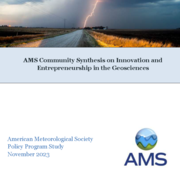Executive Summary
There is great potential for new ideas and entrepreneurial activity within the geosciences to have a significant impact throughout society. This is all the more important as the scale of human activities has grown to be large relative to the planet and the life-support services the Earth system provides.
This American Meteorological Society (AMS) Policy Program study synthesizes input on opportunities and challenges in innovation and entrepreneurship within the geosciences. The study was carried out in an accelerated time frame in response to a request from the National Science Foundation for rapid community input. We focused most heavily on the weather, water, and climate (WWC) segment of the geosciences, referred to as the Weather, Water, and Climate Enterprise, drawing from the community served by AMS. We found that there is innovation and entrepreneurship across a broad spectrum of activities within this community, from new instrumentation for observations to new analysis techniques to new applications software aimed at decision-makers. A few key challenges related to the preparation of those in the geosciences for jobs in the private sector in general, and entrepreneurship in particular, surfaced in nearly every discussion we had with members of the community. We explore those challenges here and offer some recommendations that might address aspects of them.
The input received from community members throughout the course of this study highlights the rapid pace of development as well as several areas where action could be taken to further enable entrepreneurial activity.
Key takeaways:
- There are many programs at the federal, state, and regional level that can be utilized to support entrepreneurial activities, but many individuals in the geosciences are not aware of the wealth of resources available to them. Modest changes in university curricula and new programs by scientific and professional societies could effectively raise awareness of these opportunities.
- Many researchers lack adequate preparation to make the transition to entrepreneur. There is a need for additional training to gain these needed skill sets, which includes knowing when to seek outside expertise.
- Additional funding for existing federal Small Business Innovation Research (SBIR) and Small Business Technology Transfer (STTR)programs at agencies that serve the geosciences could yield a significant increase in successful commercialization of geoscience innovations. In particular, the expansion of these programs to provide small “Phase 0” grants would support the additional training that most geoscience researchers need to be ready to take on entrepreneurial efforts.
- In some cases, the most effective path to commercialization is connecting a researcher with a new idea with an entrepreneur who can take it to commercialization. There are examples of successful matching programs that could be emulated by universities and scientific and professional societies with a high likelihood of success.
Recommendations in this report provide specific actions that can be taken by federal agencies, universities, and scientific and professional societies to address key challenges for increasing successful entrepreneurial activities and for better preparing students to enter the private sector workforce.
